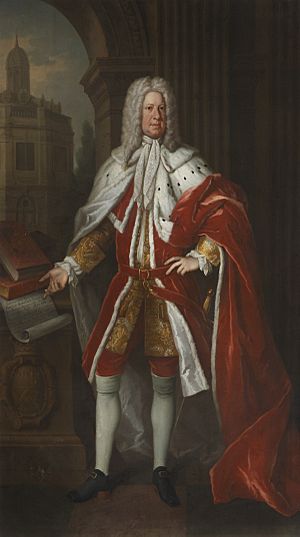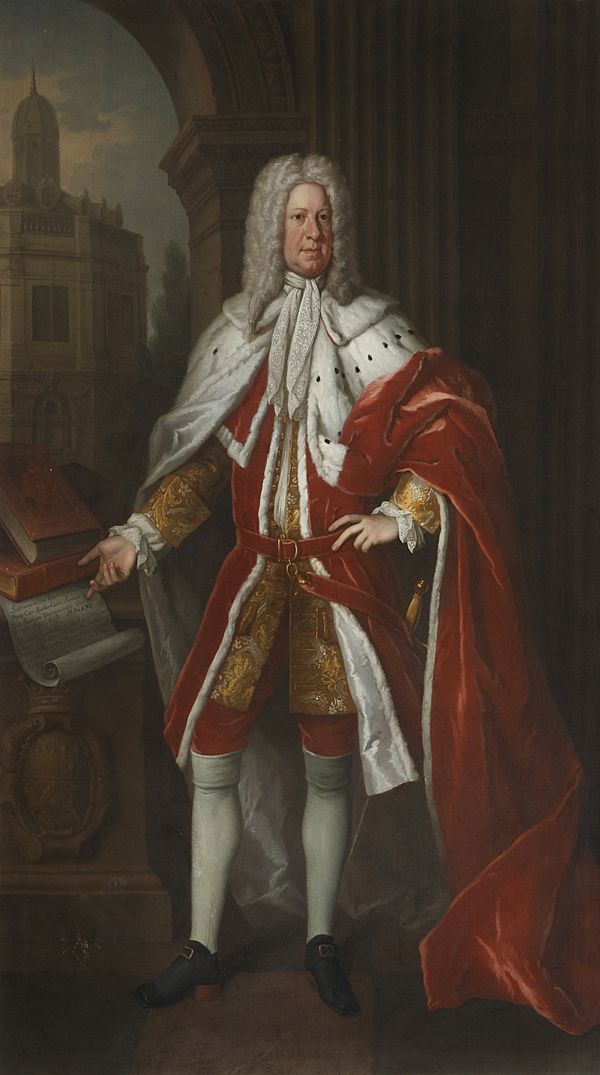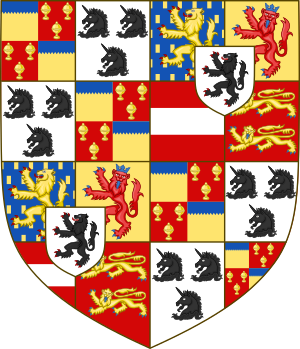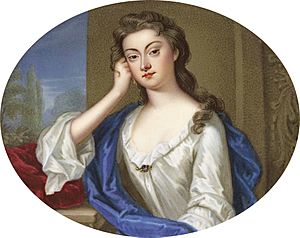Charles Butler, 1st Earl of Arran facts for kids
Quick facts for kids
Charles Butler
|
|
|---|---|
| Earl of Arran (Ireland) | |
|
Detail from portrait below
|
|
| Tenure | 1722–1758 |
| Born | 4 September 1671 |
| Died | 17 December 1758 |
| Family | Butler dynasty |
| Spouse(s) | Elizabeth Crew |
| Father | Thomas Butler, 6th Earl of Ossory |
| Mother | Emilia von Nassau |
Lieutenant-General Charles Butler, 1st Earl of Arran (1671–1758) was an important Irish nobleman. He was given the title Earl of Arran in 1693. His older brother, the 2nd Duke of Ormonde, lost his titles and lands because of his involvement in a rebellion in 1715. However, Charles was later allowed to buy back the family's lands. When his brother died, Charles technically became the 3rd Duke of Ormonde, but he never used this title.
Contents
Early Life and Family
Charles Butler was born on 4 September 1671. He was the youngest son of Thomas Butler and his wife Emilia. His father, Lord Ossory, was supposed to become a duke, but he passed away before his own father, the 1st Duke of Ormond.
Charles's family, the Butler dynasty, was a very old and powerful family in Ireland. They were originally from England and had lived in Ireland for many centuries. His mother was from the Netherlands and came from a noble family called the House of Nassau. Both of Charles's parents were Protestant.
Charles was one of eleven children, but we don't know all their names.
Becoming a Noble
Charles's father died in 1680 when Charles was only eight years old. In 1688, his grandfather, the 1st Duke of Ormond, also passed away. Charles's older brother then became the 2nd Duke of Ormond.
In 1693, Charles Butler was given several noble titles: Baron of Cloughgrenan, Viscount of Tullogh, and Earl of Arran. This made him a peer in Ireland. The next year, he also became an English peer with the title Baron Butler of Weston.
Military Career
Lord Arran chose a career in the Irish army. In 1697, he became a Colonel, leading a group of soldiers called the 6th Horse. He held this position until 1703.
In 1699, Charles became a Lord of the Bedchamber for King William III. This was an important role, meaning he was a close attendant to the King. He kept this job until the King died in 1702.
He continued to rise in the army ranks:
- On 24 January 1702, he was promoted to Brigadier General.
- In 1703, he became Colonel of the 3rd Troop of Horse Guards.
- On 1 January 1704, he was promoted to Major General.
- His final promotion was on 22 April 1708, when he became a Lieutenant-General.
From 1712 to 1714, he was also the Master-General of the Ordnance in Ireland, which meant he was in charge of military supplies and weapons.
Marriage
On 3 June 1705, Charles Butler married Elizabeth Crew in Surrey, England. Elizabeth was the daughter of Thomas Crew, 2nd Baron Crew. Charles and Elizabeth did not have any children.

Family Challenges
Charles's older brother, the 2nd Duke of Ormond, was involved in a rebellion in 1715. Because of this, he was accused of a serious crime and lost all his noble titles and lands. This process is called an "attainder."
However, in 1721, Charles was allowed by the English Parliament to buy back the family's lands that his brother had lost.
Charles was also involved in a secret plan in the early 1720s, but this plan was discovered and never happened. At this time, the "Old Pretender" (who claimed to be the rightful King of England) gave Charles the title of Duke of Arran in a special "Jacobite Peerage."
When his brother died in 1745, it was decided that his brother's British titles were lost forever due to the attainder. However, his Irish titles were not affected. This meant that Charles technically became the 3rd Duke of Ormonde in Ireland. But he didn't know this at the time and never used the title.
Some other family titles, like the Barony of Butler and the Lordship of Dingwall, could be passed down through female family members. When Charles's brother died, these titles went to his brother's only surviving child, Elizabeth. When Elizabeth died in 1750, these claims passed to Charles.
Death and Legacy
Lord Arran died in London on 17 December 1758. He was buried in St. Margaret's Church in Westminster.
When he died, many of his titles, including the Earldom of Arran and the Dukedom of Ormonde, ended because he had no children. The remaining Irish titles, like the Earldom of Ormonde, passed to a distant relative, John Butler. Charles's large estate was inherited by his unmarried sister Amelia, and then by John Butler after her death in 1760.
The claims to the Barony of Butler and the Lordship of Dingwall passed to his niece, Frances Elliot. These titles were eventually restored to the family in 1871.
A famous writer named Horace Walpole described Charles Butler as "an inoffensive old man," meaning he was a harmless and respected person. He was the last male member of the famous Ormond family.
Timeline
| Important Dates in Charles Butler's Life | ||
|---|---|---|
| Age | Date | Event |
| 0 | 1671, 4 Sep | Born. |
| 8 | 1680, 30 Jul | His father died. |
| 16 | 1688, 21 Jul | His brother became the 2nd Duke after their grandfather died. |
| 21 | 1693, 8 Mar | Created Earl of Arran. |
| 22 | 1694, 23 Jan | Created Baron Butler of Weston in England. |
| 25 | 1697 | Appointed Colonel of the 6th Horse. |
| 27 | 1699 | Appointed a lord of the bedchamber to King William III. |
| 30 | 1702, 24 Jan | Promoted Brigadier General. |
| 31 | 1703 | Appointed Colonel of the 3rd Troop of Horse Guards. |
| 32 | 1704, 1 Jan | Promoted Major-General. |
| 33 | 1705, 3 Jun | Married Elizabeth Crew. |
| 36 | 1708, 22 Apr | Promoted Lieutenant-General. |
| 43 | 1715, 21 Jun | His brother was accused of treason. |
| 49 | 1721 | Allowed to buy back his brother's estate. |
| 50 | 1722, 2 Jan | Given the title Duke of Arran by the "Old Pretender." |
| 74 | 1745, 5 Nov | Technically became the de jure 3rd Duke of Ormond after his brother died. |
| 87 | 1758, 17 Dec | Died in London. |
Images for kids
 | Sharif Bey |
 | Hale Woodruff |
 | Richmond Barthé |
 | Purvis Young |





